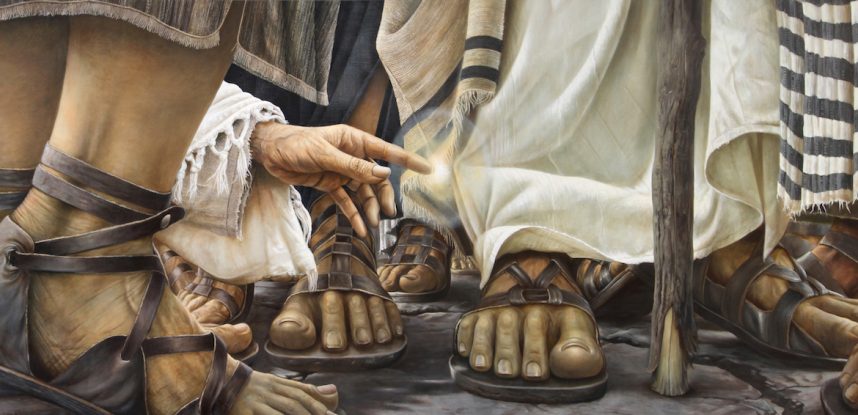Episodes

Sunday Jul 15, 2018

Saturday Jun 30, 2018

Sunday Jun 24, 2018

Sunday Jun 17, 2018

Saturday Jun 09, 2018
Learn How to Know and Listen to Your Conscience! (10OB-18)
Saturday Jun 09, 2018
Saturday Jun 09, 2018
6/10/18

Saturday Jun 02, 2018
“I know…” No, you don’t (CorpusB-18)
Saturday Jun 02, 2018
Saturday Jun 02, 2018
What is the Eucharist? If you really knew what it was we would do all we could to receive it.
The Eucharist is the Body, Blood, Soul, and Divinity of Jesus Christ. In the smallest crumb or sip from the chalice contains the entirety of the gift. Many say that they understand the Eucharist, but then treat it as if it is just a piece of bread. If one truly understands the Eucharist we must approach it in fear and trembling and gratitude. I am a priest today because of the Eucharist, may you be Catholic today and desirous of Jesus because of the Eucharist on this Corpus Christi (Feast of The Most Holy Body and Blood of Christ). 6/03/18

Sunday May 27, 2018
A Spirit of Adoption (TrinityB-18)
Sunday May 27, 2018
Sunday May 27, 2018
The most defining part of Christianity is not Jesus in himself, but the most defining part of Christianity is the reality that Jesus reveals by being a part of the Trinity, One God in Three Persons. As baptized Christians, we are invited into the relationship of the Trinity in virtue of our adoption in baptism!
Jesus gives us our mission statement today,
“Go, therefore, and make disciples of all nations,
baptizing them in the name of the Father, and of the Son, and of the Holy Spirit,
teaching them to observe all that I have commanded you.” (Matthew 28:19-20)
For Trinity Sunday today, I would like to focus on the baptism. God revealed himself to the Jewish people that He is One, but Jesus reveals a more intimate and mysterious part of God that he is One God, One substance, but three persons. God is not a solitary, brooding individual, but an eternal communion of love in relationship. We are invited into that relationship through Jesus Christ in baptism and made adopted sons and daughters in the Sonship of Christ. We have received a spirit of adoption, not a spirit of feat. In this spirit of adoption, we can be confident of God’s eternal faithfulness, even though we might turn our back on him. May we live out the reality of our baptism and remember it every time we make the sign of the cross; in the name of the Father, and of the Son, and of the Holy Spirit. 5/27/18

Sunday May 20, 2018
Peace be with you… in the Struggle (PentecostB-18)
Sunday May 20, 2018
Sunday May 20, 2018
When the Lord says, “Peace be with you” he means it. “Peace I leave with you; my peace I give to you; not as the world gives do I give to you.” John 14:27
The world is full of anxiety, and the world and Jesus offer peace. The world offers peace only through an avoidance of pain, perfection, or a shutting down ones’ conscience. Our conscience can cause a bit of anxiety as we keep on failing. What is the answer. Jesus wants to bring peace. Today he wants to give the Holy Spirit for the forgiveness of sins. The Catholic Church makes the bold claim that priests can forgive sins, but they have it through Jesus’ words today. Confession isn’t for the perfect, but the broken who need God’s mercy and grace to continue the struggle. We can see how we are doing in this struggle against the flesh and for the spirit by examining the fruits of the spirit: “love, joy, peace, patience, kindness, goodness, faithfulness, 23 gentleness, self-control” Galatians 5:23. Let us call upon the Holy Spirit and ask for the peace which only God can give in the midst of struggle and suffering of the world today. 5/20/18

Monday May 14, 2018
Let us pray… (AscensionB-18)
Monday May 14, 2018
Monday May 14, 2018
When the priest says, “Let us pray” does that mean we weren’t praying before? What kind of confusing prayer does he say after that?
Some parts of the Mass are more well known then others. The Collect, Preface, and Prayer after Communion are some of the least understood but most impactful of the changing liturgical prayers throughout the year. We walk with the Church through her prayers to remind us to be glad, rejoice, to know of our exaltation in Jesus, the Heads, Ascension, and that we might have confidence and hope in following Jesus to heaven with our humanity, body and soul, as well. Below are the text of the prayers. 5/13/18
Collect: Gladden us with holy joys, almighty God, and make us rejoice with devout thanksgiving, for the Ascension of Christ your Son is our exaltation, and, where the Head has gone before in glory, the Body is called to follow in hope. Through our Lord Jesus Christ, your Son, who lives and reigns with you in the unity of the Holy Spirit, one God, for ever and ever.
Preface: he ascended, not to distance himself from our lowly state but that we, his members, might be con dent of following where he, our Head and Founder, has gone before.
Prayer over the Offerings: We offer sacrifice now in supplication, O Lord, to honor the wondrous Ascension of your Son: grant, we pray, that through this most holy exchange we, too, may rise up to the heavenly realms. Through Christ our Lord.

Monday May 07, 2018
What is Christianity about? (6EB-18)
Monday May 07, 2018
Monday May 07, 2018
If you ask most people what Christianity is about, they would respond “to be a good person”. However, that is not what Christianity is about. It is about Love.
Christianity is not about “being a good person”, but about love. In Deus Caritas Est (God is Love) Pope Benedict XVI wrote, “Being Christian is not the result of an ethical choice or a lofty idea, but the encounter with an event, a person, which gives life a new horizon and a decisive direction.” When we encounter Christianity not as a let of burdensome laws but as an encounter with a person, God, Jesus Christ, who is love incarnate. If we really encountered this person our life would be definitively changed to look less like a normal American citizen and more like Mother Teresa. “In this is love, not that we loved God but that he loved us” (1 John 4:10). St. Paul writes, “God shows his love for us in that while we were yet sinners Christ died for us” (Romans 5:8). The starting point is not good behavior, but that God loves us. The world doesn’t know love and often we don’t either. The philosophical definition of love is “To love is to will the good of another” (CCC 1766). Jesus tells us and shows us “Greater love has no man than this, than to lay down his life for his friends” (John 15:13). Human love is broken, God’s love is what changes the world. Christianity is not about “being a good person” but about “Love” who is a person, may we never forget this truth. 5/6/18
I am including HERE the 10:30am homily that has the gospel and slight elaboration on a few things. I thought it was different enough to include it. I elaborated more on how we learn about love from parents and others in a broken way. How do we learn perfect love? From God, even Jesus learned his love from His Father and it is that love that he received that he lives on the cross, “As the Father has loved me, so have I loved you” (John 15:9). I also elaborated more on responding to the worlds answer to do whatever you want in love. St. Augustine (354-430) is quoted with saying “love, and do what you will” when preaching on 1 John 4:4-12 (our 2nd reading today) (here is the sermon, he says it in paragraph 8). He says this in the truest form of love where we are totally conformed to God and His love, not in the worldly way of love consisting solely in emotion, desire, selfishness, and pleasure. If it is a purified form of love all things become properly ordered and you only choose what is right.
“if in my life I fail completely to heed others, solely out of a desire to be “devout” and to perform my “religious duties”, then my relationship with God will also grow arid. It becomes merely “proper”, but loveless. Only my readiness to encounter my neighbor and to show him love makes me sensitive to God as well. Only if I serve my neighbor can my eyes be opened to what God does for me and how much he loves me. The saints—consider the example of Blessed Teresa of Calcutta—constantly renewed their capacity for love of neighbor from their encounter with the Eucharistic Lord, and conversely this encounter acquired its real- ism and depth in their service to others. Love of God and love of neighbor are thus inseparable, they form a single commandment. But both live from the love of God who has loved us first. No longer is it a question, then, of a “commandment” imposed from without and calling for the impossible, but rather of a freely-bestowed experience of love from within, a love which by its very nature must then be shared with others. Love grows through love.” (Deus Caritas Est 18)

